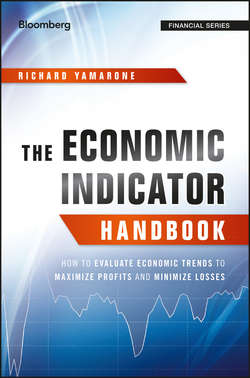Читать книгу The Economic Indicator Handbook - Ричард Ямароне - Страница 14
На сайте Литреса книга снята с продажи.
Chapter 1
The Daily Blotter
The Bloomberg Orange Book of CEO Comments
ОглавлениеThe Bloomberg Orange Book of CEO Comments (Exhibit 1.8) is a creation born out of the need to improve an existing, and somewhat staid publication used by policy makers, the Beige Book. Every seven weeks or so – eight times a year – the Federal Reserve releases the Beige Book Summary of Commentary on Current Economic Conditions by Federal Reserve District. This is essentially a compilation of anecdotes gathered by economists in each of the Fed's 12 districts. Once collected, the Fed economists strip away the source information (the name of the person or company making the comment) and don't offer a date of when the comments were made.
Exhibit 1.8 The Bloomberg Orange Book of CEO Comments
Source: Bloomberg
The Bloomberg Orange Book of CEO Comments is assembled by reading some 300 quarterly earnings transcripts of the most economically sensitive companies and extracting the most economically relevant comments by C-suite executives. Anything related to hiring, inflation, capital spending, interest rates, growth, spending, consumer developments, global economic conditions, or confidence makes it to the Orange Book. They are all collated by company and posted to the terminal. These are the actual unedited comments made by executives, identified by the person making the comment and the date that it was made.
By typing ORANGE <GO> on the Bloomberg terminal, you will access the history of all entries, ordered by several different classifications. By clicking on a sector in the pie chart on the Orange Book page depicted in Exhibit 1.8, any of the companies may be found. So, for example, if you wanted to know the comments made by executives in the energy sector, a mere click would reveal the comments made by Hess, Chevron, Halliburton, or Arch Coal.
In addition, there is a search function that permits the user to filter comments by Fed District. So, if you wanted to mimic the Fed's Beige Book by district, you simply check the regional bank on the left, say Atlanta, and all the comments made by executives that are headquartered in the district will be revealed – for example, in the Atlanta District: Flowers Foods, UPS, Coca-Cola, Beazer Homes, Home Depot, and so on.
One of the more useful functions of the Orange Book is to identify trends in specific economic conditions. By entering a specific phrase of word like deflation, job cuts, or Obamacare in the <Narrow Search> field, any mention of those terms from a conference call would appear.
This makes the analysis of so many topics and themes considerably easy. With the Bloomberg Orange Book, you can learn what is on the minds of some of the most important business people in the United States.
In addition, the company transcripts are each scored with respect to its tone – that is, positive, negative, or neutral. Admittedly, the overwhelming majority (usually 290 of 300) are neutral since every conference call doesn't exude a definitive tone. But it is quite evident when a company is downbeat or sanguine about the economic outlook. Keep in mind, the gist of the Orange Book is not to understand how an individual company is performing, but what their perceptions are regarding the U.S. economic situation. A company can have stellar financial results, soaring earnings and escalating profits, but if they mention a near-term recession or a mass furlough of workers that might be scored a “negative.” This is another reason so many companies are graded as “neutral,” C-suite officials don't always mention the economic assessment.
Economists need to know where the financial markets are trading throughout the session, particularly those of Treasuries and currencies. The equity market is a very important measure as well, but its relevance is somewhat limited since it is not open as long as the fixed income and currency market. For example, when an economic release hits the tape at 8:30 a.m. ET – as so many major reports do – the U.S. stock market hasn't begun trading and will not for another hour. Not only will the fixed-income and currency markets be open and trading for the majority of economic releases, but in the event that some news or event breaks overseas (in Europe, Asia, or Africa and the Middle East) and overnight, bonds and currencies will trade with respect to the circumstances.
